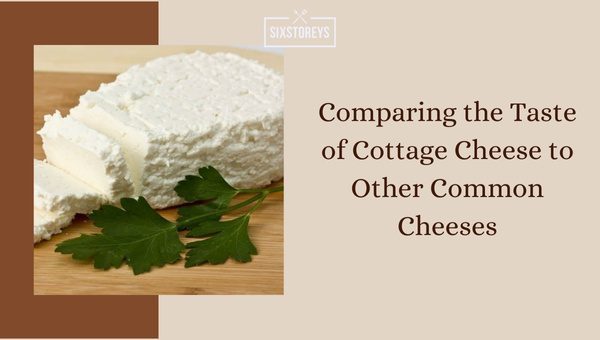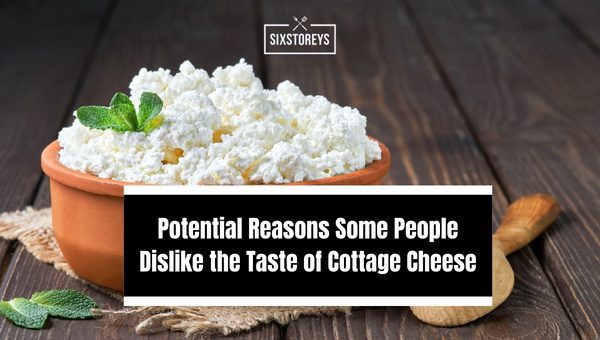What Does Cottage Cheese Taste Like? Taste Buds Alert
You've seen it in your local supermarket or deli, you might even have it sitting in your fridge right at this moment; but have you ever stopped to consider, "What does cottage cheese taste like?" This humble dairy product garners strong opinions - some swear by its distinct flavor, while others can't quite make their peace with it. But unless you've braved a spoonful, it's tough to put a finger on the unique profile of cottage cheese's taste that sets it apart from other dairy derivatives.
Whether you're someone who has never dared to venture into the world of cottage cheese, or someone who's been dabbling in it without quite identifying the nuances of flavor, this post aims to dissect and demystify the taste of cottage cheese for the uninitiated and the curious. Dive in as we unpack the flavors, textures, and even the nutritive values of this oh-so-versatile food that so many of us can't seem to agree upon.
Also Read: Best Spreadable Cheese Brands
Article Includes
What Does Cottage Cheese Taste Like?

Cottage cheese carries a mild, slightly tangy flavor with just a hint of natural sweetness. Its taste often compared to a subtler and less salty version of feta cheese. What's more, the creaminess and slightly grainy, curd-like texture add a unique layer to its overall taste profile.
Unraveling the Taste Profile
Cottage cheese is characterized by a fresh, barely-there flavor, much lighter in comparison to stronger, aged cheeses. It possesses a slight tanginess reminiscent of yogurt, derived from the lactic acid created during the fermentation process. It's not uncommon to detect a light underlying sweetness, a result of fresh milk used in its creation.
The Role of Salt
Depending on the brand and type of cottage cheese, there could also be a slight saltiness. This stems from added salt, which acts as a preservative and flavor enhancer. However, the salt doesn't overpower, remaining complementary to the overall mildness.
Despite its somewhat bland reputation, cottage cheese is incredibly versatile. The subtle nature of its taste allows it to work well with an array of ingredients. Sweet or savory, this cheese can comfortably play a role, blending seamlessly or providing a gentle contrast of flavors. Whether it's integrated into a delicious salad, baked into a casserole, or enjoyed plain with freshly cut fruit, the unique taste of cottage cheese always finds a way to shine through.
So, in short, the taste of cottage cheese can be described as mild, creamy with a slight tang, and a tiny punch of saltiness. But the real magic? It's all in how it superbly melds with other ingredients!
Understanding the Flavor Profile of Cottage Cheese
Cottage cheese, as it enters your mouth, immediately presents a mixture of creaminess and curdled texture. This gives it a mild yet attractive taste profile. The predominant sensation is its light creaminess, owing to the spoonfuls of milk it's bathed in.
The cheese has a humble whiff of saltiness, which is far from overwhelming, but strong enough to give it a slight edge. This salty tinge treads the thin line of being too assertive to suit a dessert but has just enough punch to work in a superlative savory dish.
What fully rounds off its flavor profile is a requisite shot of tanginess. This light and ever-so-subtle tanginess gives it that familiar cheese-like kick. Yet, it is this quality that allows cottage cheese to lend itself effortlessly to a wide range of dishes.
Comparing the Taste of Cottage Cheese to Other Common Cheeses

Having a sense of what cottage cheese tastes like in its raw form, it's equally interesting to contrast it with other familiar cheeses.
Let's begin with the king of all cheeses, cheddar. Known for its strong flavor, cheddar can be sharp and robust; it paints a stark contrast to the mild and modest taste of cottage cheese.
Moving on to mozzarella, a favorite for pizzas worldwide. It bears a creaminess that is quite similar to cottage cheese. However, it lacks the curdled texture and has a bit more elasticity and chewiness.
Comparatively, brie does share that creamy palette with cottage cheese but in a far more intense and rich manner. Also, brie tends to be slightly sour and is more robust in taste.
Finally, let's take Parmesan, a hard cheese known for its gritty texture and strong, nutty taste. This flavor boldness is in direct contrast to the mild, laid-back flavor of cottage cheese.
This comparison makes it clear that when it comes to cheeses, cottage cheese is quite unique with its blend of mild yet flavorful features. You'll find that it's an excellent standalone snack, as well as a versatile ingredient that can enhance the taste of many dishes.
Cheese Comparison Table
| Cheese | Texture | Flavor |
| Cottage Cheese | Creamy, Curdled | Mild, Slightly Salty, Light Tanginess |
| Cheddar | Hard, Crumbly | Sharp, Strong |
| Mozzarella | Elastic, Creamy | Mild, Milky |
| Brie | Soft, Creamy | Rich, Slightly Sour |
| Parmesan | Hard, Gritty | Strong, Nutty |
Remember, at the end of the day, taste is subjective and depends on one's palate. Some might enjoy the robustness of cheddar over the mildness of cottage cheese and vice versa. The key is to find what works best for you and your culinary creations.
The Influence of Brand and Processing on Cottage Cheese Flavor
When it comes to cottage cheese, not all brands are created equal. Just as with any product, there can be significant variations in taste, texture, and overall quality from one manufacturer to another. Some folks might love a particular brand for its creamy richness, while others might prefer a lighter, more acidic variety.
The process of making cottage cheese also impacts its flavor. Traditionally, cottage cheese is made by adding an acid to milk, which curdles the milk and creates the small lumps or "curds." This curd is then rinsed, drained, and oftentimes mixed with cream to create the final product we know and love. Brands that take the extra time to craft their product using traditional methods, avoiding artificial additives and preservatives, often produce cottage cheese with a more robust flavor profile.
What Does Cottage Cheese Pair Well With?

Why limit yourself to a bowl of plain cottage cheese when there’s a wide variety of delicious pairings to explore?
- Fruits: Cottage cheese pairs beautifully with fresh berries, peaches, and pears because of their sweetness.
- Vegetables: For a savory twist, it goes surprisingly good with tomatoes, cucumbers, bell peppers, avocados, and even steamed broccoli or carrots.
- Grains: Cottage cheese tastes wonderful atop toasted whole grain bread or mixed with oatmeal.
For flavor combinations that are out-of-this-world, try sprinkling your cottage cheese with some nuts and seeds or drizzling it with honey. Spice it up with a pinch of black pepper or give it a refreshing twirl with some chopped mint leaves.
Also Read: Best Shredded Cheddar Cheeses
The Role of Cottage Cheese in Various Recipes
From sweet to savory, breakfast to dinner, you’d be surprised at just how spoilt for choice you are when it comes to incorporating cottage cheese into different recipes.
- Breakfast: Cottage cheese pancakes turn your regular pancakes high-protein treats.
- Desserts: Ever tried cottage cheese cookies? Mild and cheesy, they make for soft, fluffy bites of goodness.
- Pasta: Cottage cheese can be a surprisingly good in lasagna or stuffed shells.
- Salads: Toss in a handful of cottage cheese into your salad and watch how it amplifies your experience.
- Smoothies: Blend it into a smoothie. Sure, it might sound strange, but apart from adding creaminess, it also loads your drink with protein.
Over to you - whether you're a seasoned cottage cheese lover or a curious newbie, look beyond the container and achieve the best culinary experience through a keen understanding of your cottage cheese!
Potential Reasons Some People Dislike the Taste of Cottage Cheese

The taste of cottage cheese is far from universal admiration. While some relish its unique tang and texture, there are many who don't quite share the same sentiment. But why does this simple, wholesome food divide opinions so starkly? Here are a few potential reasons:
Its Unconventional Texture
The texture of foods plays a large part in whether we enjoy them or not. The curdled texture of cottage cheese, which is nothing like the smooth, firm texture of cheddar or the blissful meltiness of mozzarella, can be a bit of a shock, especially for first-timers. To some, cottage cheese may feel too grainy or lumpy, which takes away from their overall enjoyment of the cheese.
The 'Tangy' Factor
Unlike many of its counterparts, cottage cheese boasts a tangy kick. This sharp taste, arising from the culturing process, can be a bit disconcerting for those who prefer their cheese to be purely mellow and mild. If you're more of a brie or gouda person, the zing in cottage cheese might not appeal to your taste buds.
The 'Milkiness'
Cottage cheese is a fresh cheese, which means it retains more of its milky origins than aged cheeses. This can lead to a milky aftertaste, which, while loved by some, can be offputting to others, particularly those who aren’t fans of milk.
Associations With Dieting
Historically, cottage cheese has often been marketed as a diet food due to its low fat content compared to other cheeses. Some people may thus associate it with weight loss diets or eating regimes they didn't enjoy, which can affect how they perceive the taste.
Every individual's tastebuds are unique in their own way. The world of foods and flavors is subjective, hence what one might relish could also be what another dislikes. The key is not to be intimated or apprehensive but to relish the journey of exploring a wide range of tastes and textures. The saying "don't knock it 'til you've tried it" is definitely apt when it comes to tackling the taste of cottage cheese. But if you've tried it already and it just doesn't click, that's perfectly alright too. As they say, variety is the spice of life, and there are plenty other cheeses in the deli!
Also Read: Best Shredded Mozzarella Cheeses
Frequently Asked Questions
Is cottage cheese spicy or sweet?
Cottage cheese itself is neither spicy nor sweet. It has a mildly tangy flavor with a slight hint of saltiness. You can however add sweet or spicy elements to it to suit your preference.
Does cottage cheese taste like other cheeses?
Cottage cheese has a distinct flavor that sets it apart from other cheeses. It's less salty when compared to feta and less creamy than a brie. While it does share the overall dairy profile of cheeses, it has a unique curdy texture and a fresh, tangy flavor.
Can you eat cottage cheese raw?
Absolutely! Cottage cheese can be eaten straight out of the container. It's also a common ingredient in salads, dips, desserts, and more.
Is eating cottage cheese like eating yoghurt?
Not exactly. Cottage cheese has a curdled structure and a creamy mouthfeel, much different from the smooth, uniform consistency of yogurt. While both have a certain tanginess, the flavor profile of cottage cheese is uniquely its own.
What does low-fat cottage cheese taste like?
Low-fat cottage cheese has a slightly less rich flavor compared to its full-fat counterpart. This could make it taste a bit more tangy or sour, which some may find appetizing, while others may find it less appealing.
Can you describe cottage cheese texture?
Cottage cheese has a unique texture that is both creamy and curdled. It features small, semisoft curds interspersed in a creamier, more liquid base.
Can the taste of cottage cheese vary from brand to brand?
Definitely. Much like any other food product, the taste of cottage cheese can vary due to differences in manufacturing processes, ingredient quality, and recipe specificity among different brands.
How can I use cottage cheese in cooking?
The versatility of cottage cheese is one of its biggest draws. It can be used in a variety of dishes from savory to sweet. Incorporate it in salads, blend it into smoothies, stir it into pasta, or use it as a topping for toast. The possibilities are endless!
Conclusion
In the realm of dairy delicacies, cottage cheese holds its own unique spot. Its flavor is subtle, yet distinctive, and its texture gives it a versatility that has made it beloved in cuisines worldwide. Whether one savors every spoonful or uses it as a protein-rich addition to various dishes, knowing what cottage cheese tastes like allows everyone to better appreciate this dairy standout.
Sure, its flavor may not be for everyone, but it's worth giving cottage cheese a chance to shine on your palate and in your recipes. Its creaminess, slight saltiness, and touch of tang make it a cheese worth understanding, appreciating, and incorporating in your culinary journey. Remember, a world of cuisine awaits those who are willing to taste and explore!

